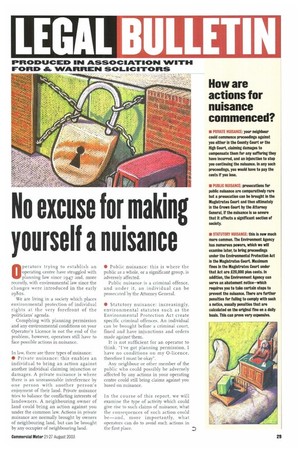How are actions for nuisance commenced?
Page 29

If you've noticed an error in this article please click here to report it so we can fix it.
• PRIVATE NUISANCE; your neighbour could commence proceedings against you either In the County Court or the High Court, claiming damages to compensate them for any suffering they have incurred, and an injunction to stop you continuing the nuisance. In any such proceedings, you would have to pay the costs if you lose.
E PUBLIC NUISANCE: prosecutions for public nuisance are comparatively rare but a prosecution can be brought in the Magistrates Court and then ultimately in the Crown Court by the Attorney General, if the nuisance is so severe that it affects a significant section of society.
• STATUTORY NUISANCE: this is now much more common. The Environment Agency has numerous powers, which we will examine later, to bring proceedings under the Environmental Protection Act in the Magistrates Court. Maximum fines In the Magistrates Court under that Act are 220,000 plus costs. In addition, the Environment Agency can serve an abatement notice—which requires you to take certain steps to prevent the nuisance. There are further penalties for failing to comply with such a notice, usually penalties that are calculated on the original fine on a daily basis. This can prove very expensive.
































































































































































